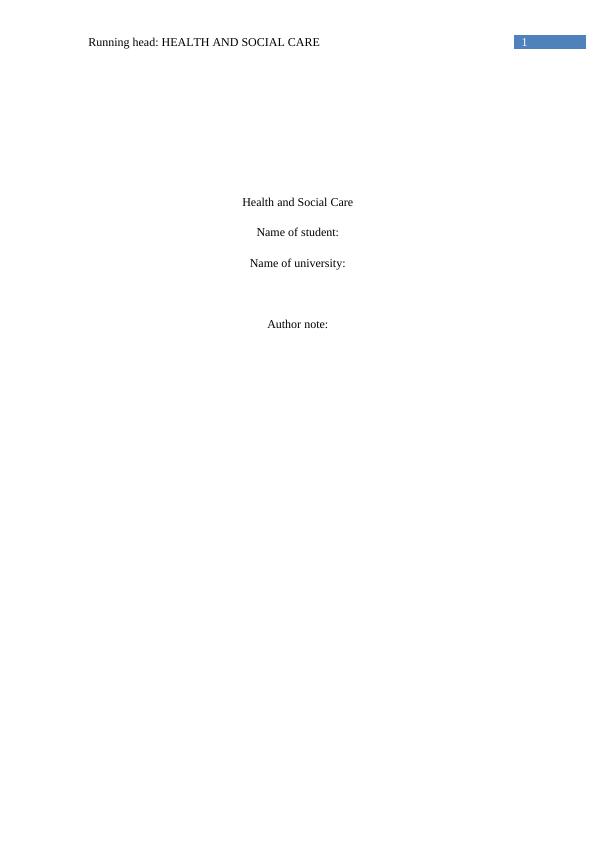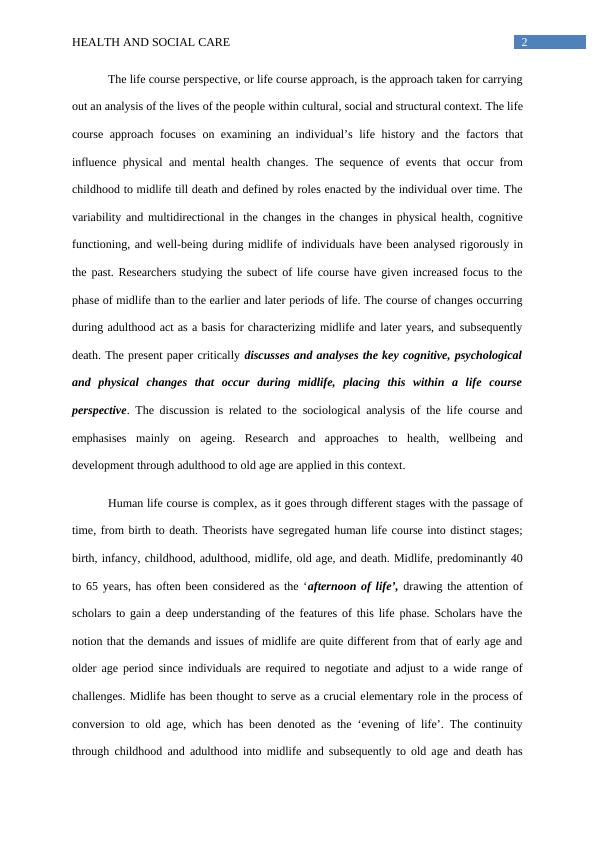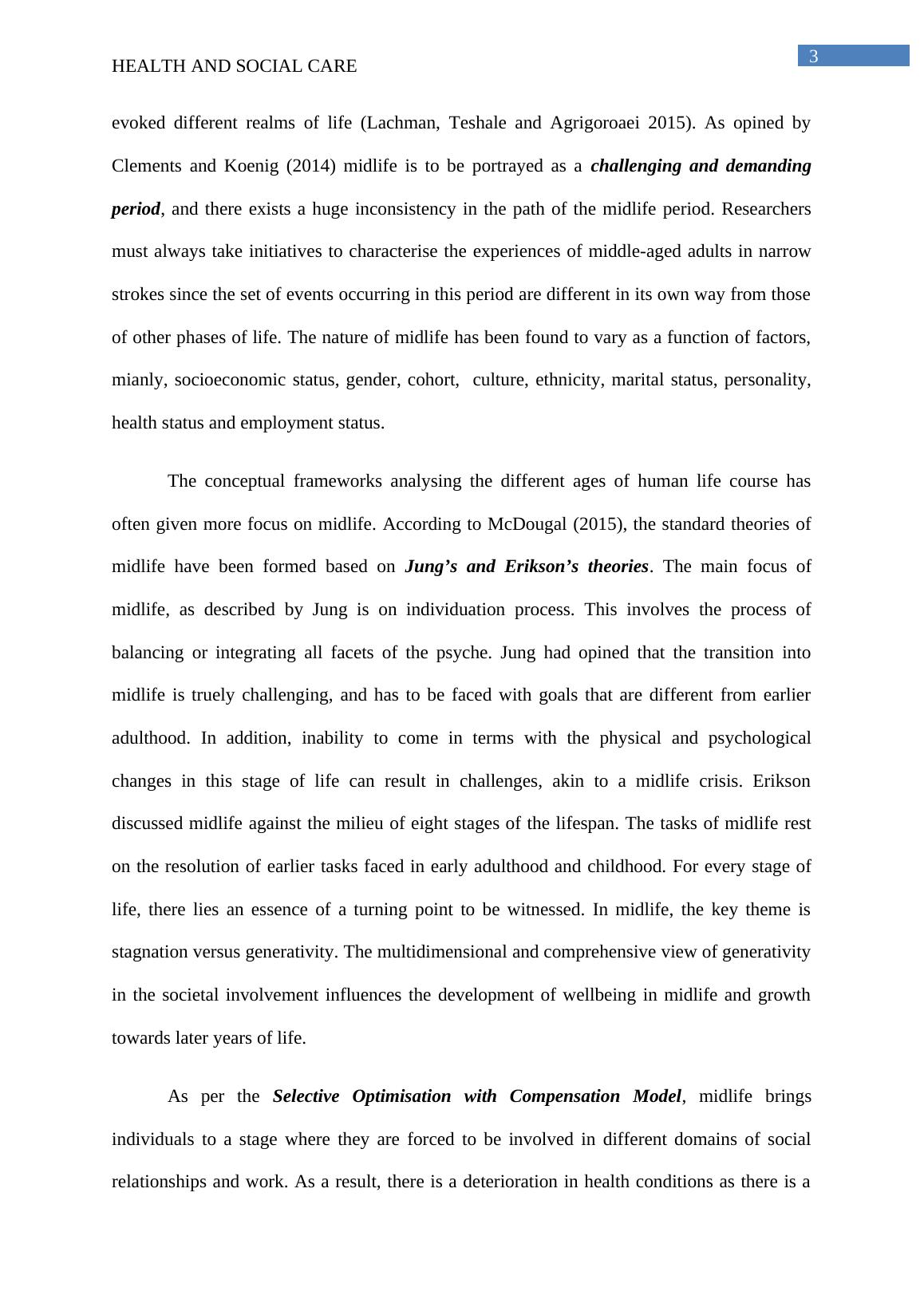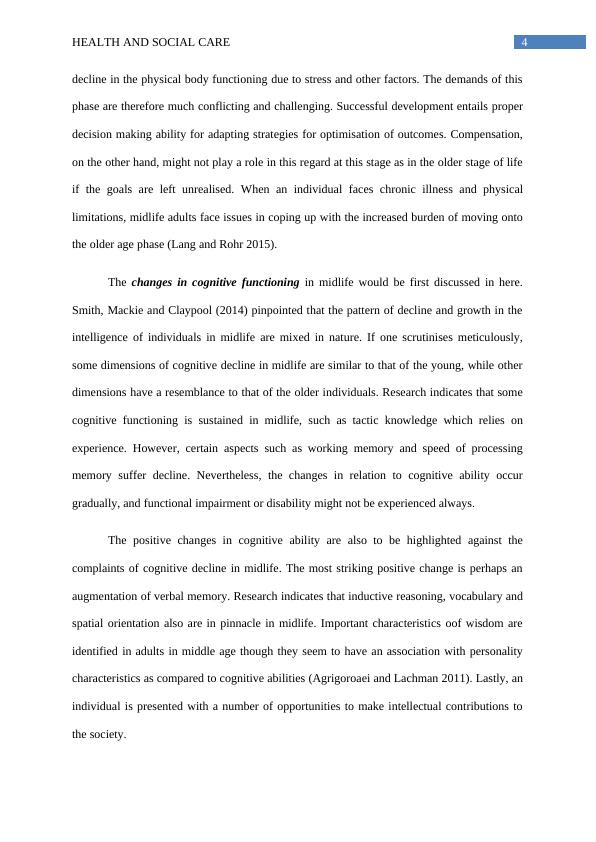Ask a question from expert
Sociological Analysis of the Life Course
11 Pages3380 Words293 Views
Added on 2020-05-28
Sociological Analysis of the Life Course
Added on 2020-05-28
BookmarkShareRelated Documents
1Running head: HEALTH AND SOCIAL CAREHealth and Social CareName of student:Name of university:Author note:

2HEALTH AND SOCIAL CAREThe life course perspective, or life course approach, is the approach taken for carryingout an analysis of the lives of the people within cultural, social and structural context. The lifecourse approach focuses on examining an individual’s life history and the factors thatinfluence physical and mental health changes. The sequence of events that occur fromchildhood to midlife till death and defined by roles enacted by the individual over time. Thevariability and multidirectional in the changes in the changes in physical health, cognitivefunctioning, and well-being during midlife of individuals have been analysed rigorously inthe past. Researchers studying the subect of life course have given increased focus to thephase of midlife than to the earlier and later periods of life. The course of changes occurringduring adulthood act as a basis for characterizing midlife and later years, and subsequentlydeath. The present paper critically discusses and analyses the key cognitive, psychologicaland physical changes that occur during midlife, placing this within a life courseperspective. The discussion is related to the sociological analysis of the life course andemphasises mainly on ageing. Research and approaches to health, wellbeing anddevelopment through adulthood to old age are applied in this context. Human life course is complex, as it goes through different stages with the passage oftime, from birth to death. Theorists have segregated human life course into distinct stages;birth, infancy, childhood, adulthood, midlife, old age, and death. Midlife, predominantly 40to 65 years, has often been considered as the ‘afternoon of life’, drawing the attention ofscholars to gain a deep understanding of the features of this life phase. Scholars have thenotion that the demands and issues of midlife are quite different from that of early age andolder age period since individuals are required to negotiate and adjust to a wide range ofchallenges. Midlife has been thought to serve as a crucial elementary role in the process ofconversion to old age, which has been denoted as the ‘evening of life’. The continuitythrough childhood and adulthood into midlife and subsequently to old age and death has

3HEALTH AND SOCIAL CAREevoked different realms of life (Lachman, Teshale and Agrigoroaei 2015). As opined byClements and Koenig (2014) midlife is to be portrayed as a challenging and demandingperiod, and there exists a huge inconsistency in the path of the midlife period. Researchersmust always take initiatives to characterise the experiences of middle-aged adults in narrowstrokes since the set of events occurring in this period are different in its own way from thoseof other phases of life. The nature of midlife has been found to vary as a function of factors,mianly, socioeconomic status, gender, cohort, culture, ethnicity, marital status, personality,health status and employment status. The conceptual frameworks analysing the different ages of human life course hasoften given more focus on midlife. According to McDougal (2015), the standard theories ofmidlife have been formed based on Jung’s and Erikson’s theories. The main focus ofmidlife, as described by Jung is on individuation process. This involves the process ofbalancing or integrating all facets of the psyche. Jung had opined that the transition intomidlife is truely challenging, and has to be faced with goals that are different from earlieradulthood. In addition, inability to come in terms with the physical and psychologicalchanges in this stage of life can result in challenges, akin to a midlife crisis. Eriksondiscussed midlife against the milieu of eight stages of the lifespan. The tasks of midlife reston the resolution of earlier tasks faced in early adulthood and childhood. For every stage oflife, there lies an essence of a turning point to be witnessed. In midlife, the key theme isstagnation versus generativity. The multidimensional and comprehensive view of generativityin the societal involvement influences the development of wellbeing in midlife and growthtowards later years of life. As per the Selective Optimisation with Compensation Model, midlife bringsindividuals to a stage where they are forced to be involved in different domains of socialrelationships and work. As a result, there is a deterioration in health conditions as there is a

4HEALTH AND SOCIAL CAREdecline in the physical body functioning due to stress and other factors. The demands of thisphase are therefore much conflicting and challenging. Successful development entails properdecision making ability for adapting strategies for optimisation of outcomes. Compensation,on the other hand, might not play a role in this regard at this stage as in the older stage of lifeif the goals are left unrealised. When an individual faces chronic illness and physicallimitations, midlife adults face issues in coping up with the increased burden of moving ontothe older age phase (Lang and Rohr 2015). The changes in cognitive functioning in midlife would be first discussed in here.Smith, Mackie and Claypool (2014) pinpointed that the pattern of decline and growth in theintelligence of individuals in midlife are mixed in nature. If one scrutinises meticulously,some dimensions of cognitive decline in midlife are similar to that of the young, while otherdimensions have a resemblance to that of the older individuals. Research indicates that somecognitive functioning is sustained in midlife, such as tactic knowledge which relies onexperience. However, certain aspects such as working memory and speed of processingmemory suffer decline. Nevertheless, the changes in relation to cognitive ability occurgradually, and functional impairment or disability might not be experienced always. The positive changes in cognitive ability are also to be highlighted against thecomplaints of cognitive decline in midlife. The most striking positive change is perhaps anaugmentation of verbal memory. Research indicates that inductive reasoning, vocabulary andspatial orientation also are in pinnacle in midlife. Important characteristics oof wisdom areidentified in adults in middle age though they seem to have an association with personalitycharacteristics as compared to cognitive abilities (Agrigoroaei and Lachman 2011). Lastly, anindividual is presented with a number of opportunities to make intellectual contributions tothe society.

End of preview
Want to access all the pages? Upload your documents or become a member.
Related Documents
Physical, Cognitive and Psychosocial Changes in Middle Adulthoodlg...
|11
|3145
|445
Psychosocial Processes and Social Construction of Middle Agelg...
|13
|3500
|41
Midlife Crisis Concept - PDFlg...
|12
|3047
|21
Aging Most Important Phases of Lifelg...
|7
|1777
|38
Psychological Approaches : Dave and Jennylg...
|9
|3072
|26
Key Physical, Cognitive, and Psychosocial Changes During Midlifelg...
|9
|3342
|79